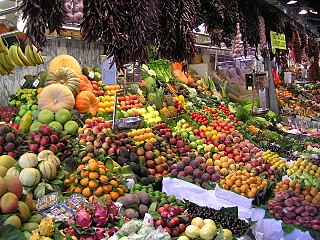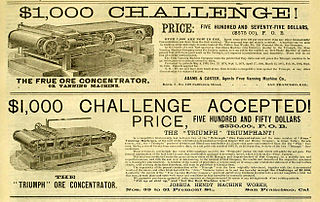In economics, a free market is an economic system in which the prices of goods and services are determined by supply and demand expressed by sellers and buyers. Such markets, as modeled, operate without the intervention of government or any other external authority. Proponents of the free market as a normative ideal contrast it with a regulated market, in which a government intervenes in supply and demand by means of various methods such as taxes or regulations. In an idealized free market economy, prices for goods and services are set solely by the bids and offers of the participants.

Intellectual property (IP) is a category of property that includes intangible creations of the human intellect. There are many types of intellectual property, and some countries recognize more than others. The best-known types are patents, copyrights, trademarks, and trade secrets. The modern concept of intellectual property developed in England in the 17th and 18th centuries. The term "intellectual property" began to be used in the 19th century, though it was not until the late 20th century that intellectual property became commonplace in most of the world's legal systems.
The labor theory of value (LTV) is a theory of value that argues that the exchange value of a good or service is determined by the total amount of "socially necessary labor" required to produce it. The contrasting system is typically known as the subjective theory of value.
A monopoly, as described by Irving Fisher, is a market with the "absence of competition", creating a situation where a specific person or enterprise is the only supplier of a particular thing. This contrasts with a monopsony which relates to a single entity's control of a market to purchase a good or service, and with oligopoly and duopoly which consists of a few sellers dominating a market. Monopolies are thus characterised by a lack of economic competition to produce the good or service, a lack of viable substitute goods, and the possibility of a high monopoly price well above the seller's marginal cost that leads to a high monopoly profit. The verb monopolise or monopolize refers to the process by which a company gains the ability to raise prices or exclude competitors. In economics, a monopoly is a single seller. In law, a monopoly is a business entity that has significant market power, that is, the power to charge overly high prices, which is associated with unfair price raises. Although monopolies may be big businesses, size is not a characteristic of a monopoly. A small business may still have the power to raise prices in a small industry.

Open-source licenses are software licenses that allow content to be used, modified, and shared. They facilitate free and open-source software (FOSS) development. Intellectual property (IP) laws restrict the modification and sharing of creative works. Free and open-source licenses use these existing legal structures for an inverse purpose. They grant the recipient the rights to use the software, examine the source code, modify it, and distribute the modifications. These criteria are outlined in the Open Source Definition.
In economics, imperfect competition refers to a situation where the characteristics of an economic market do not fulfil all the necessary conditions of a perfectly competitive market. Imperfect competition causes market inefficiencies, resulting in market failure. Imperfect competition usually describes behaviour of suppliers in a market, such that the level of competition between sellers is below the level of competition in perfectly competitive market conditions.
A free good is a good that is not scarce, and therefore is available without limit. A free good is available in as great a quantity as desired with zero opportunity cost to society.

In economics, deadweight loss is the loss of societal economic welfare due to production/consumption of a good at a quantity where marginal benefit does not equal marginal cost – in other words, there are either goods being produced despite the cost of doing so being larger than the benefit, or additional goods are not being produced despite the fact that the benefits of their production would be larger than the costs. The deadweight loss is the net benefit that is missed out on. While losses to one entity often lead to gains for another, deadweight loss represents the loss that is not regained by anyone else. This loss is therefore attributed to both producers and consumers.
Information goods are commodities that provide value to consumers as a result of the information it contains and refers to any good or service that can be digitalized. Examples of information goods includes books, journals, computer software, music and videos. Information goods can be copied, shared, resold or rented. Information goods are durable and thus, will not be destroyed through consumption. As information goods have distinct characteristics as they are experience goods, have returns to scale and are non-rivalrous, the laws of supply and demand that depend on the scarcity of products do not frequently apply to information goods. As a result, the buying and selling of information goods differs from ordinary goods. Information goods are goods whose unit production costs are negligible compared to their amortized development costs. Well-informed companies have development costs that increase with product quality, but their unit cost is zero. Once an information commodity has been developed, other units can be produced and distributed at almost zero cost. For example, allow downloads over the Internet. Conversely, for industrial goods, the unit cost of production and distribution usually dominates. Firms with an industrial advantage do not incur any development costs, but unit costs increase as product quality improves.
In neoclassical economics, economic rent is any payment to the owner of a factor of production or resource supply of which is fixed. In classical economics, economic rent is any payment made or benefit received for non-produced inputs such as location (land) and for assets formed by creating official privilege over natural opportunities. In the moral economy of neoclassical economics, economic rent includes income gained by labor or state beneficiaries of other "contrived" exclusivity, such as labor guilds and unofficial corruption.
A grey market or dark market is the trade of a commodity through distribution channels that are not authorized by the original manufacturer or trade mark proprietor. Grey market products are products traded outside the authorized manufacturer's channel.

In Marxist philosophy, the term commodity fetishism describes the economic relationships of production and exchange as being social relationships that exist among things and not as relationships that exist among people. As a form of reification, commodity fetishism presents economic value as inherent to the commodities, and not as arising from the workforce, from the human relations that produced the commodity, the goods and the services.
A royalty payment is a payment made by one party to another that owns a particular asset, for the right to ongoing use of that asset. Royalties are typically agreed upon as a percentage of gross or net revenues derived from the use of an asset or a fixed price per unit sold of an item of such, but there are also other modes and metrics of compensation. A royalty interest is the right to collect a stream of future royalty payments.
Anti-competitive practices are business or government practices that prevent or reduce competition in a market. Antitrust laws ensure businesses do not engage in competitive practices that harm other, usually smaller, businesses or consumers. These laws are formed to promote healthy competition within a free market by limiting the abuse of monopoly power. Competition allows companies to compete in order for products and services to improve; promote innovation; and provide more choices for consumers. In order to obtain greater profits, some large enterprises take advantage of market power to hinder survival of new entrants. Anti-competitive behavior can undermine the efficiency and fairness of the market, leaving consumers with little choice to obtain a reasonable quality of service.
The law of the value of commodities, known simply as the law of value, is a central concept in Karl Marx's critique of political economy first expounded in his polemic The Poverty of Philosophy (1847) against Pierre-Joseph Proudhon with reference to David Ricardo's economics. Most generally, it refers to a regulative principle of the economic exchange of the products of human work, namely that the relative exchange-values of those products in trade, usually expressed by money-prices, are proportional to the average amounts of human labor-time which are currently socially necessary to produce them within the capitalist mode of production.
In economics, a market is a composition of systems, institutions, procedures, social relations or infrastructures whereby parties engage in exchange. While parties may exchange goods and services by barter, most markets rely on sellers offering their goods or services to buyers in exchange for money. It can be said that a market is the process by which the prices of goods and services are established. Markets facilitate trade and enable the distribution and allocation of resources in a society. Markets allow any tradeable item to be evaluated and priced. A market emerges more or less spontaneously or may be constructed deliberately by human interaction in order to enable the exchange of rights of services and goods. Markets generally supplant gift economies and are often held in place through rules and customs, such as a booth fee, competitive pricing, and source of goods for sale.

In economics, competition is a scenario where different economic firms are in contention to obtain goods that are limited by varying the elements of the marketing mix: price, product, promotion and place. In classical economic thought, competition causes commercial firms to develop new products, services and technologies, which would give consumers greater selection and better products. The greater the selection of a good is in the market, the lower prices for the products typically are, compared to what the price would be if there was no competition (monopoly) or little competition (oligopoly).
The commercialization of copylefted works differs from proprietary works. The economic focus tends to be on the commercialization of other scarcities, and complimentary goods rather than the free works themselves. One way to make money with copylefted works is to sell consultancy and support to the users of the work. Generally, financial profit is expected to be much lower in a business model utilising copyleft works only than in a business using proprietary works. Another way is to use the copylefted work as a commodity tool or component to provide a service or product. Android phones, for example, include the Linux kernel, which is copylefted. Unlike business models which commercialize copylefted works only, businesses which deal with proprietary products can make money by exclusive sales, single and transferable ownership, and litigation rights over the work, although some view these methods as monopolistic and unethical, such as those in the Free Software Movement and the Free Culture Movement.

Hoarding in economics refers to the concept of purchasing and storing a large amount of product belonging to a particular market, creating scarcity of that product, and ultimately driving the price of that product up. Commonly hoarded products include assets such as money, gold and public securities, as well as vital goods such as fuel and medicine. Consumers are primarily hoarding resources so that they can maintain their current consumption rate in the event of a shortage. Hoarding resources can prevent or slow products or commodities from traveling through the economy. Subsequently, this may cause the product or commodity to become scarce, causing the value of the resource to rise.
In economics, a government-granted monopoly is a form of coercive monopoly by which a government grants exclusive privilege to a private individual or firm to be the sole provider of a good or service; potential competitors are excluded from the market by law, regulation, or other mechanisms of government enforcement. As a form of coercive monopoly, government-granted monopoly is contrasted with an unregulated monopoly, wherein there is no competition but it is not forcibly excluded.







